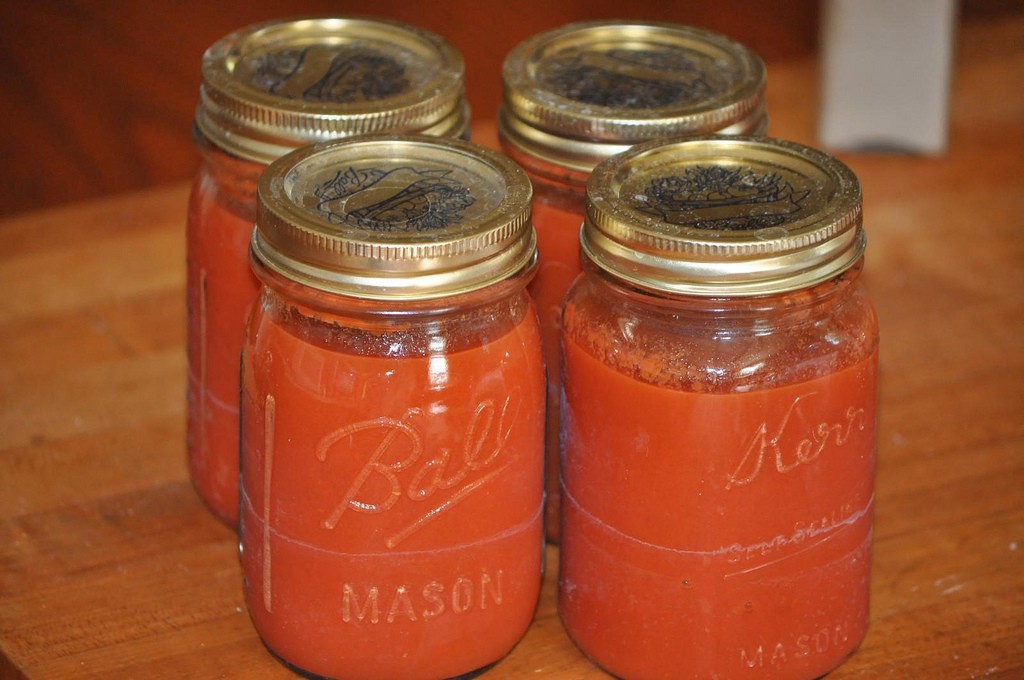A Tomato Sauce Tradition
by Erica Taddeo

No one in my family has ever bought a jar of pasta sauce. It’s just not our style. Like most Italian families around here, we’d go to the basement and grab a jar of our homemade sauce off the shelves. Growing up, I didn’t even know that not everyone did this.
We spent one Sunday every summer making that year’s supply of tomato sauce for the entire family. We’d take bushels of market-fresh Italian tomatoes, ripened in the warmth of a plexiglass shed my grandfather built next to his garden, and spend sunrise to sunset turning them into a year’s worth of meals.
Every time I woke up on tomato day, I found the adults in my family already hard at work in the backyard: My grandfather building a fire in the garden to boil enormous pots of water (it wasn’t until much later that I found out almost no one built fires anymore, and other families had an outdoor gas stove for this purpose); my father and uncle prepping and moving those enormous pots; my mother, aunt, and grandmother washing tomatoes.
As soon as we were old enough to use paring knives, we’d help clean the tops and blemishes off each tomato and score it to make it boil and drain faster. We piled the tomatoes into huge, store-bought and homemade colanders built to fit into the giant pots of water. We pulled the colanders out of the pots, stirring and stabbing the boiled tomatoes to drain out excess water. Poking holes in squishy tomatoes is just one of those memories I’ll always associate with summers and childhood, like gliding down a slip-and-slide or making a mess of an ice cream cone.
Once drained, tomatoes were pressed, just a few at a time, through an electric tomato strainer. I can’t even imagine what it would have been like to press them in a hand-cranked strainer like my Nonna did when she was young. We saved all the leftover bits of tomato flesh and skin and ran them through the strainer a few more times, until no more puree came out of them. We composted the skins when we were done with them — nothing went to waste.
Bucketfuls of bright red tomato puree were ladled into freshly washed Mason jars, each prepped with a sprig of basil from the garden. My parents and grandparents kept a watchful eye over each jar. Too little sauce in a jar? Wasteful. Too much could cause the glass to burst when it was boiled for canning. I popped lids onto the jars, handing them to my grandfather to twist them shut. He’d wrap them in clean rags, the same ones we used every year just for this purpose, right before boiling them.
By this point in the day, the entire family was a little tired (though my Nonno never showed it.) We were hungry, too. Some of our freshly made sauce would be simmering on the stove, ready to be poured over pasta and devoured. My grandparents always believed in rewarding a hard day’s work with a good meal. Sweet, flavorful, freshly pressed sauce from tomatoes perfectly sun-ripened until that very morning is and always will be one of the best things I’ve ever tasted. My Nonna always says that a meal tastes better when you earn it. It wasn’t that we earned that incredible flavour; we had just worked hard to get everything right, every detail, every step in the process.
We don’t make sauce every summer anymore. Things have changed: my grandfather passed away and the rest of the family is getting older. Every now and then someone will decide that it’s worth making just a few bushels’ worth of sauce that year, and whoever is available to help will come around. Sometimes friends and neighbors will join us; people who didn’t grow up doing this but who want to see what it’s like, or try their hand at canning. If we run out of homemade sauce, we buy bottled Italian tomato puree. Simmer it with some oil and garlic, and it’s the next best thing to homemade. So many of my friends marvel at my ability to make sauce out of tomatoes, rather than out of a jar. That’s just how I make it. I don’t know if it’s cost-effective, but it’s easy, it’s delicious, and it’s one of the oldest things in my cooking repertoire. I wouldn’t have it any other way.
This story is part of our food month series, which we just wrapped up.
Erica works as a subtitle editor and moonlights as a hockey blogger.
Photo: JeffrewW
Support The Billfold
The Billfold continues to exist thanks to support from our readers. Help us continue to do our work by making a monthly pledge on Patreon or a one-time-only contribution through PayPal.
Comments